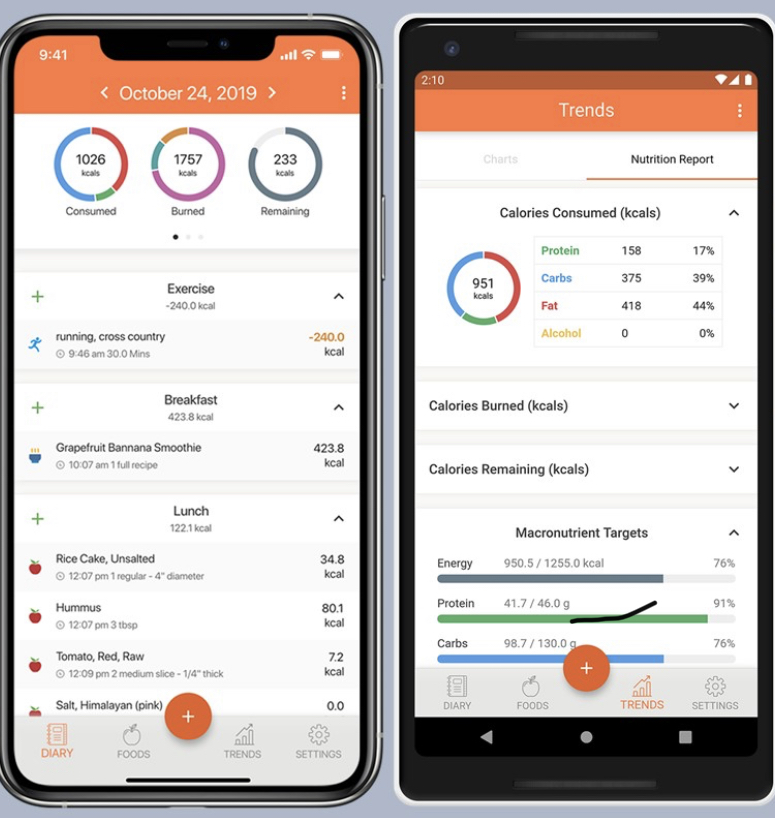Counting calories: How a graded assignment could have detrimental consequences
Photo courtesy Google Creative Commons
The app Chronometer is used by nutrition students to track their daily calorie intake.
TW: This article discusses calorie tracking and disordered eating.
As a senior with a strong interest in health and fitness, I was excited to take Honors Nutrition as an elective this year. However, within the first month of the school year, I realized how dangerous mixing eating habits and graded assignments can be at this vulnerable age. Due to the sequence of unintended consequences that can result from the encouragement of calorie-tracking behaviors, I strongly believe these assignments should be removed from the Honors Nutrition curriculum.
Around the third week of school our class was given the assignment to download the app Chronometer and track everything we ate for three days. The app asks you to input your weight and an exercise estimate, before giving you a calorie goal for each day. After you input a food, its calorie amount and nutrition info is added to your daily journal. At the top of the screen, the app displays a “calories consumed” and “calories remaining” section.
On the first day of the assignment, I unknowingly entered the serving sizes wrong from my breakfast and lunch, putting down almost double of what I actually ate. By 12 p.m., the chronometer app said I had already consumed more than half of my calories for the day. I felt internal panic immediately. How was I supposed to make it through practice and dinner without going over the limit? I stressed about my food the rest of the day before I realized my mistake.
The next day, I had a field hockey team dinner where they were serving Chick-fil-a. My first thought was how bad it would look in my food journal to have fast food. I briefly considered eating a healthier dinner at home and missing out on the team bonding, before deciding to simply enter a different dinner into my app, a white lie in my assignment.
In the end, my customary calorie intake ended up being essentially perfect for my goal each day. However, the point of me sharing those stories was to illustrate how although I live a perfectly normal, even healthy lifestyle, being asked to count my calories for a graded assignment infiltrated my head with unnecessary anxiety over every item of food I consumed. An anonymous senior in the class shared her concerns. “I find this assignment to contradict a lot of the knowledge that we had already learned, like to not make massive changes in our diets right away because they would not be sustainable in the long run. When you are asked to record everything you have eaten it becomes triggering for many and causes lots of food guilt. This assignment, as well as many other of the calorie tracking ones, could be transformed to be more beneficial for teenagers instead of causing them to feel like they can only eat low calorie foods,” the student said.
I am lucky to have grown up in a household where I was taught that food was fuel and that when your body is hungry, the best thing to do is to listen to it. However, not everyone is so fortunate. Though this graded assignment might not be the sole cause of disordered eating on its own, it could unknowingly be the tipping point for a teenager who has an unsteady body image to begin with. This is clearly a prevalent issue among the highschool age group; according to the National Association of Anorexia Nervosa and Associated Disorders, more than 35-57% of teenage girls have exhibited disordered eating behaviors.
Honors nutrition is an important course, and I am by no means lobbying for its removal. I have learned so much helpful information about how to keep my body as healthy and happy as possible that I think every teenager should know. I also acknowledge that some people taking this course were not fazed by this assignment, and might even have developed healthier habits because of it. That being said, I hope my experiences will allow people to gauge the thought process of an average teenage girl being asked to keep track of every calorie she intakes, and the possible risks that come along with that. Perhaps in future years, the assignment could strictly focus on tracking the amount of nutrients, like protein and vitamins, that we should consume in the day.
Your donation will support the student journalists of Thomas S. Wootton High School. Your contribution will allow us to purchase equipment and cover our annual website hosting costs.
Mandy is a 2023 graduate.






![The 2025-2026 Editorial Board Alex Grainger, Cameron Cowen, Helen Manolis, Emory Scofield, Ahmed Ibrahim, Rebekah Buchman, Marley Hoffman, Hayley Gottesman, Pragna Pothakamuri and Natalie Pak (Chase Dolan not pictured) respond to the new MCPS grading policy. “When something that used to be easy suddenly becomes harder, it can turn [students’] mindset negative, whereas making something easier usually has a better impact. I think that’s where a lot of the pushback comes from. But if you put emotions aside, I do think this change could help build stronger work ethic,” Ibrahim said.](https://woottoncommonsense.com/wp-content/uploads/2025/09/fqr5bskTXpn0LRQMmKErLuNKdQYBlL726cFXBaWF-600x450.jpg)
